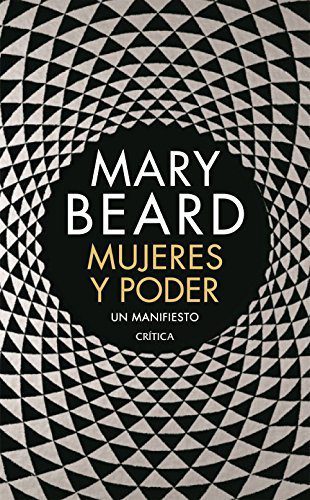Title: Mujeres y poder
Author: Mary Beard
First published November 2, 2017
112 pages, Paperback
ISBN: 9789584265210 (ISBN10: 9584265210)
Rating: 4.03
Overview
In her book Mujeres y poder, Mary Beard, renowned classicist and committed feminist, sheds light on the historical treatment of powerful women and female characters with her signature wit and wisdom. From the ancient world to modern times, Beard’s examples range from Penelope, Medusa, and Athena to Theresa May and Hillary Clinton.
By examining cultural foundations of misogyny and the public voice of women, she challenges our assumptions about women’s relationship with power and the resistance women face in conforming to male standards. Drawing from personal experiences of sexism and gender aggression on social media, Beard raises the question: if women aren’t perceived to be within existing power structures, is it not necessary to redefine power altogether?
About the Author
Mary Beard is a professor of Classics at the University of Cambridge, and she is also a fellow of Newnham College. She is well known for her role as the Classics editor of the Times Literary Supplement and for her regular column called “A Don’s Life” in The Times.
Mary Beard is often in the media, and she is known for her sometimes controversial public statements. Because of this, she is often referred to as “Britain’s best-known classicist.”
Mary Beard was born on January 1st, 1955, in Much Wenlock, Shropshire, and she was an only child. Her father, Roy Whitbread Beard, was an architect in Shrewsbury, and her mother, Joyce Emily Beard, was a headmistress who loved to read.
Mary Beard attended an all-female direct grant school, and during the summer, she participated in archaeological excavations. Initially, she did this to earn money for fun activities, but she soon found that she loved studying antiquity.
When Mary Beard was 18, she was interviewed for a place at Newnham College, Cambridge. She had considered going to King’s College but ultimately decided against it because the college did not offer scholarships to women.
Mary Beard was studying at a single-sex college, but she found that some men in the University had dismissive attitudes towards women’s academic potential. This made her even more determined to succeed, and she developed feminist views that remained important to her throughout her life.
After receiving an MA at Newnham College, Mary Beard remained in Cambridge to pursue her PhD. She later lectured in Classics at King’s College London and returned to Cambridge in 1984 as a fellow of Newnham College.
In 1985, she co-wrote a book called “Rome in the Late Republic” with the Cambridge ancient historian Michael Crawford. The same year, she married Robin Sinclair Cormack, and they had a daughter in 1985 and a son in 1987.
Mary Beard became the Classics editor of the Times Literary Supplement in 1992.
Mary Beard is also known for her opinions on world events. Shortly after the 9/11 attacks, she contributed an article to the London Review of Books in which she stated that many people believed that the United States had brought the attacks upon itself.
In a 2007 interview, she said that the hostility these comments provoked had not subsided, but she believed that most people now accept that terrorism is associated with American foreign policy.
In 2004, Mary Beard became a professor of Classics at Cambridge, and she has also served as the Visiting Sather Professor of Classical Literature at the University of California, Berkeley. She delivered a series of lectures on “Roman Laughter” during her time there.
Editoral Review
Mary Beards Mujeres y Poder is a timely and thought-provoking book that confronts some of the most difficult questions facing women today. Beard, a renowned classicist and feminist, examines the long history of women in power and how this history has shaped our current beliefs and attitudes towards womens leadership.
Through her sharp analysis and persuasive arguments, Beard challenges us to rethink what power means and how it should be distributed in our society. The book is structured around two lectures that Beard delivered in 2014 and 2017.
In the first lecture, Beard examines the ways in which women have been excluded from public discourse and political power throughout history. She traces the roots of this exclusion back to ancient Greece, where women were confined to the home and their voices were silenced.
In the second lecture, Beard looks at how women can reclaim their power and challenge the status quo. She argues that we need to rethink our assumptions about leadership and recognize the valuable contributions that women can make.
One of the strengths of Mujeres y Poder is Beards ability to make complex historical and philosophical ideas accessible to a broad audience. She writes with intelligence and wit, using examples from everyday life to illustrate her points.
Her arguments are compelling and well-researched, drawing on a wide range of sources from antiquity to the present day. Beards style is engaging and at times provocative, but also deeply human.
She weaves her own personal experiences into the narrative, sharing with us the challenges she has faced as a woman in academia. Her willingness to be vulnerable and share her own story makes the book all the more powerful.
While Beards analysis is persuasive, there are moments where her arguments feel incomplete or underdeveloped. For example, she acknowledges that there is no single feminist approach to power, but doesnt explore this idea in depth.
Similarly, while she calls for a more inclusive and collaborative approach to leadership, she doesnt provide concrete steps for achieving this. Despite these limitations, Mujeres y Poder is an important and timely book.
It sheds light on the history of womens exclusion from power and offers a compelling vision for a more equitable future. Beards insight and passion make this book a must-read for anyone interested in womens rights, political philosophy, or the future of leadership.
Rating: 4 out of 5 stars.



